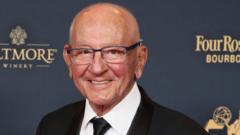In an exciting development for comedy fans, Sky has announced an upcoming "star-studded" British version of Saturday Night Live (SNL), set to launch next year. The US institution has entertained audiences for 50 years with its unique formula of live sketch comedy, celebrity appearances, and musical performances, led by creator Lorne Michaels. But can a UK adaptation achieve the same success?
The iconic opening line, "Live from New York, it's Saturday night!", has been a hallmark of SNL since its inception in 1975. It quickly became a training ground for comedic legends like Bill Murray and Tina Fey. However, as Rachel Aroesti from The Guardian points out, the British version will have its hurdles, primarily the lack of the rich heritage that the original enjoys, which has shaped its legacy and appeal.
Helen Lewis from The Atlantic describes Sky's decision to pursue a UK SNL as "courageous" but acknowledges the challenges posed by substantial differences in the comedic landscape between the US and UK. The financial backing for the American SNL far exceeds what is typically available for British television, potentially impacting production quality and the ability to attract big-name talent.
Critics note that American humor often leans towards slapstick, while Britain's comedic tradition tends to feature more satirical and sometimes darker humor, a dichotomy that the new show will have to navigate. Comedic writer Jack Bernhardt notes that the cultural differences in comedy cannot simply be overcome by launching a British version of a well-known format.
Despite these challenges, the drawing power of iconic brands like SNL remains compelling. Previous attempts to adapt US late-night formats in the UK haven't always succeeded, yet shows like Friday Night Live and The 11 O'Clock Show during the 1980s provided platforms for comedians who would later become major names.
Veteran British producer Jimmy Mulville emphasizes the potential for new talent development through this platform. If Sky assembles a strong team of writers and performers, there's optimism about creating a successful British version. The requirement for authenticity is paramount; the show must resonate as a UK original, rather than a rehash of its American counterpart.
In a changing media landscape, characterized by the growth of streaming and social media, the bite-sized nature of sketch comedy aligns well with current consumption trends. As SNL clips gain millions of views across platforms like TikTok, the UK iteration will have to harness this potential to appeal to a modern audience with evolving tastes.
As the anticipation builds for the UK version of SNL, all eyes will be on its ability to balance the spirit of the original with an authentic British twist, proving that "live from London" can carve its niche in the comedy landscape.





















